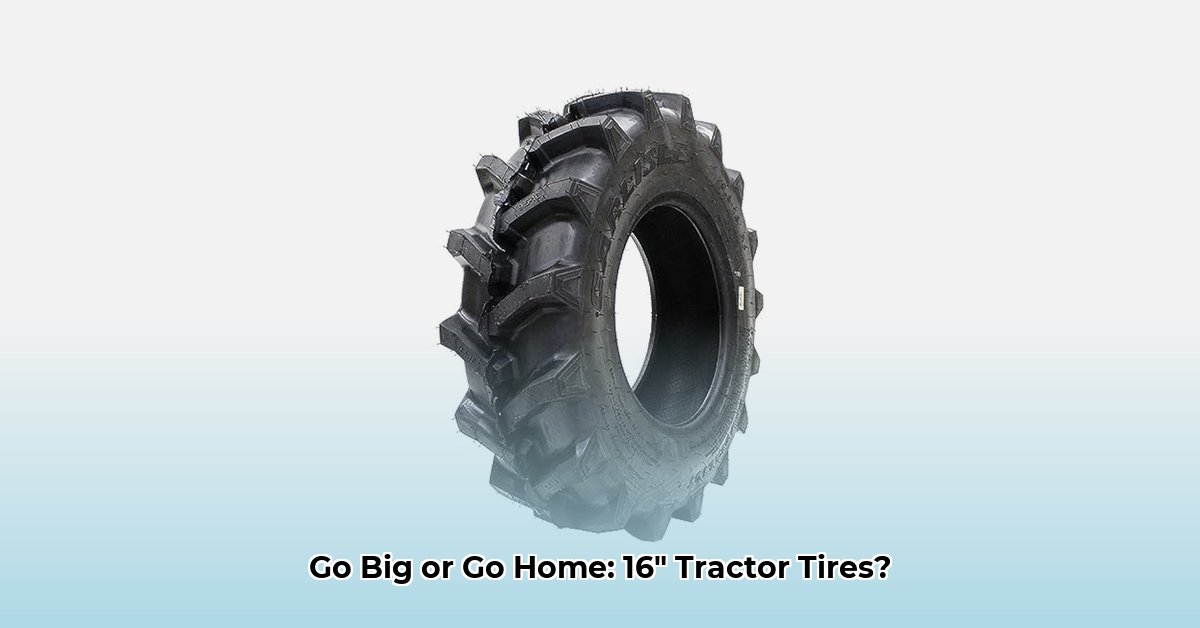
Choosing the right tires for your small tractor is crucial for both efficiency and environmental responsibility. This guide focuses on 16-inch tractor tires, exploring how tire selection impacts fuel consumption, soil compaction, and overall farm sustainability. We'll provide practical advice and actionable steps to help you make informed decisions. For more information on tractor tires, check out this helpful resource: tractor tire guide.
Understanding the Importance of Tire Selection
The seemingly small detail of your tractor tires significantly impacts your farm's sustainability and bottom line. Improper tire selection leads to increased fuel consumption, soil compaction, and reduced yields. Conversely, selecting the right tires can improve fuel efficiency, protect soil health, and contribute to a more sustainable farming operation. This is particularly important for smaller tractors using 16-inch tires, where the impact of tire pressure and design is more pronounced.
Key Factors Influencing Tire Selection
Several factors determine the suitability of a 16-inch tractor tire for your specific needs. These are not mutually exclusive, and careful consideration of all factors is essential:
Weight Capacity: Choosing tires with insufficient weight capacity risks damage to the tires themselves, potentially leading to blowouts and costly repairs. Oversizing leads to unnecessary weight and expense. Accurately determine the combined weight of your tractor and any towed equipment to select appropriate weight capacity.
Air Pressure: Maintaining the correct tire pressure is critical. Underinflation leads to excessive soil compaction, while overinflation decreases traction. Regularly check and adjust tire pressure according to the manufacturer's recommendations, ensuring optimal performance and a balance between traction and compaction.
Tread Pattern: The tread pattern dictates traction. Deep treads are better suited for wet or muddy conditions, offering superior grip. Shallower treads are more suitable for firmer ground, maximizing efficiency and minimizing soil disturbance.
Tire Construction (Radial vs. Bias-Ply): Radial tires generally offer improved fuel efficiency and a smoother ride. Bias-ply tires are often less expensive initially, but they typically show lower fuel efficiency and higher rates of soil compaction. Weigh the long-term cost benefits of radial tires against their higher initial investment.
Sustainable Farming and 16-Inch Tractor Tires
Sustainable agriculture seeks to minimize environmental impact while maximizing productivity. Your tire choice plays a surprisingly large role in this effort.
Soil Health: Soil compaction reduces water infiltration, hinders root growth, and diminishes crop yields. Low-pressure tires minimize compaction, contributing to soil health and long-term productivity. This is particularly relevant for smaller tractors where the weight is concentrated on a smaller area.
Fuel Efficiency: Tires with low rolling resistance minimize energy loss, resulting in fuel savings. This reduces your operating costs while lowering your carbon footprint.
Tire Lifespan: Investing in high-quality tires translates to longer lifespan, thus reducing waste and costs associated with frequent tire replacements.
A Step-by-Step Guide to Choosing Sustainable 16-Inch Tractor Tires
This structured approach will guide you toward making an informed decision:
Assess Your Soil Type: Determine your soil type (sandy, clay, loam, etc.) as this significantly impacts tire tread selection.
Calculate the Load: Accurately determine the total operating weight of your tractor and any towed implements.
Consult Manufacturer Recommendations: Check your tractor and tire manuals for recommended inflation pressures and tire specifications.
Compare Tire Constructions: Weigh the long-term fuel economy and soil compaction benefits of radial tires against the lower initial cost of bias-ply tires.
Compare Prices and Features: Get quotes and specifications from multiple suppliers to compare costs and ensure compatibility with your tractor.
Tire Technology and Sustainable Practices
Modern tire technology offers solutions for mitigating soil compaction. Key advancements include:
IF (Improved Flexion) Tires: These tires allow lower inflation pressures without sacrificing load capacity, significantly reducing compaction.
VF (Very High Flexion) Tires: These offer further improvements in flexibility and low-pressure capability, leading to even greater soil protection.
Implementing precision farming techniques, such as GPS-guided steering, further minimizes soil compaction by reducing overlaps and unnecessary tire passes.
Conclusion: Sustainable Choices for a Sustainable Future
The choice of 16-inch tractor tires has significant ramifications for the sustainability and profitability of your farm. By carefully assessing your needs, understanding tire technology, and implementing best practices, you can make informed decisions that lead to improved soil health, increased efficiency, and reduced environmental impact. Remember, this is an ongoing process; new technologies and sustainable practices are continually being developed, so remaining informed about the latest advances is crucial for long-term success.